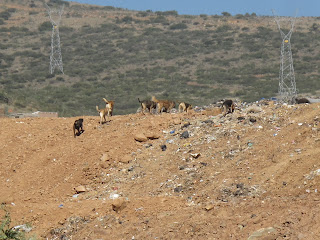This week Sarah and I got the shits because I had my backpack stolen. The pack had a bunch of important stuff in it. It really challenged us. Very uncool. The twist on this minor catastrophe was that the preceding six days were some of the best ever.
Victim of crime (for the second time in Bolivia)
Sunday was a big downer. I have already written about, and experienced, the potential dangers of travelling through La Cancha but on Sunday being familiar got the best of me. Sarah, Hester and I were in a bus and I had taken a photo out the window. I had done this while we were stuck in gridlock. Looking out the window brought me to the conclusion that this would be a good opportunity to capture the spirit of the market. Hindsight now tells us that this was the antithesis of “good opportunity.”
A few minutes after taking the photo a guy reached up through the window and snatched my backpack from my lap. The window of the bus that is. I never had a chance, he was so quick. We raced off the bus and chased after him. Some people pointed directions but it was impossible. In La Cancha you are amongst the multitudes and there was no way we were going to catch him. And what if we had caught him, what were we going to do? Mercifully I had my wallet in my pocket.
La semana pasada
Besides the low moment on Sunday my week was a flood of brilliant experiences. It was a week that recalled our first seven days in South America. When we arrived in Buenos Aires everything felt worthy of commentary. I was in a perpetual state of wonder. Similarly, this week was stacked in the same kind of way.
The week started with my new Spanish teacher who is excellent, the Climate Change Conference and Eco Village (where I saw the very entertaining band Cartel Afonico). Later in the week I started watching The Wire lent to us by our friends Jason and Emily, I got to write and run every day and I started volunteering at an orphanage called Casa Cuna on Wednesday.
The weekend begun with a great night out seeing another friend (Lindsay) off then on Saturday morning I slept in and read. At midday a massive parade came down our - inconsequential - street (like a mini Oruro Carnival) and then in the afternoon I played football with the Sustainable Bolivia crew and scored a bunch of goals. Later in the evening I ate the best burritos and drank beer.
On Sunday I went to the local derby between Aurora and Wilstermann in the late afternoon. Aurora levelled the scores 2-2 in the last two seconds of the game. It was an intense ending to the game and it led to a punch-up out the front of the Stadium post-match. Having had enough drama from La Cancha earlier in the day I covered my Aurora jersey with a t-shirt to avoid any unwanted beatings; Aurora fans are outnumbered twenty-to-one.
And on it goes. I could write ten more bullet points underneath each of those moments, or (even worse) 2000 words per item. I could write 5000 word on the orphanage. The point being that it is confronting to be filled with anger (and I am angry) about having my bag stolen while (a) having such abundance in my life and/or (b) spending time with orphans who have no parents and play with broken-ass toys day after day and are happier than any adult I know. In the end I am going to assume that my anger is coming from my own stupidity (i.e. shame) so I will just have to deal with that. In the meantime I will reflect on this week past and keep it all in perspective.




















